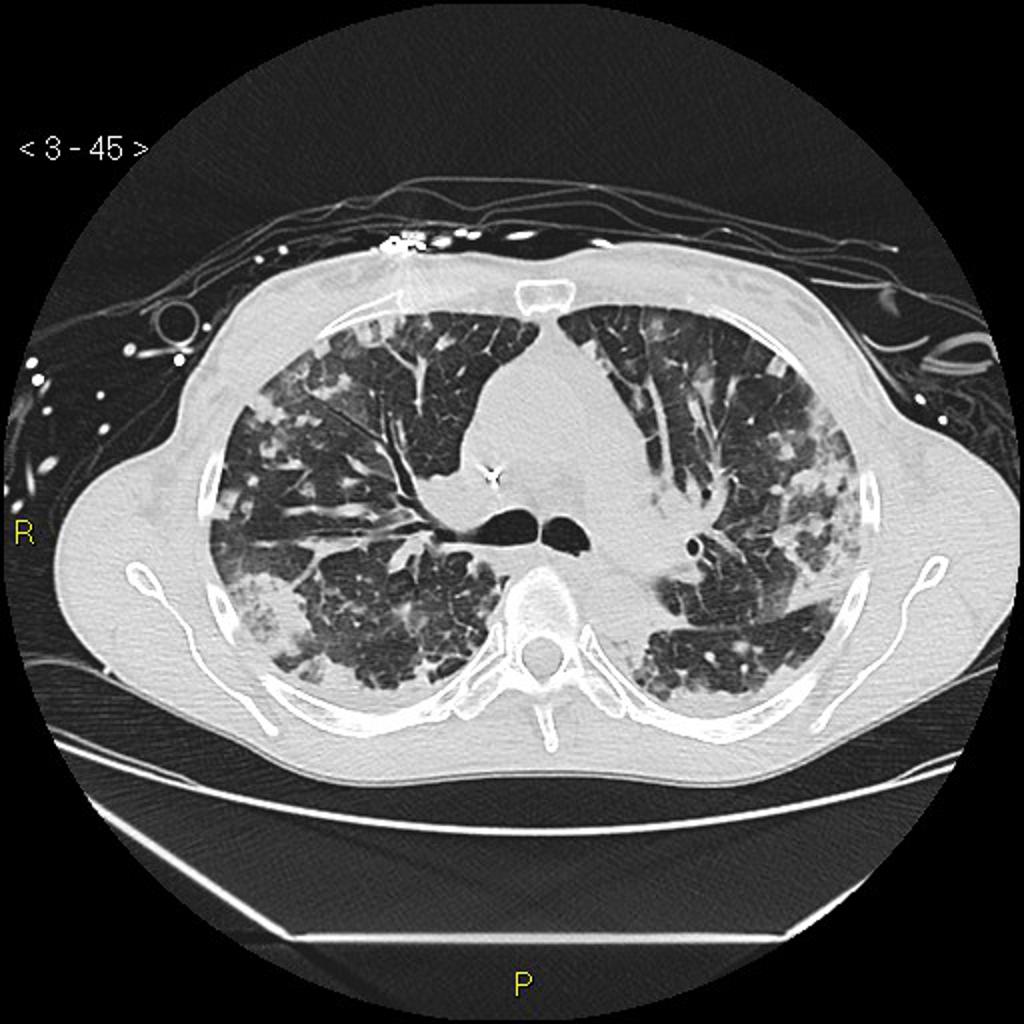Acute respiratory distress syndrome CT: Difference between revisions
mNo edit summary |
No edit summary |
||
| Line 1: | Line 1: | ||
__NOTOC__ | __NOTOC__ | ||
{{Acute respiratory distress syndrome}} | {{Acute respiratory distress syndrome}} | ||
{{CMG}} | {{CMG}}, {{AE}} {{BShaller}} | ||
==Overview== | ==Overview== | ||
There are no findings on [[CT scan|Computed tomography (CT)]] that are diagnostic of ARDS, however, CT may be used to better define the extent of lung injury or identify potential underlying causes of ARDS. | |||
==CT== | ==CT== | ||
[[CT scan|Computed tomography (CT)]] may also be used in the evaluation of patients with ARDS. Although there are no CT findings that are diagnostic of ARDS, some common features include: | |||
*Pulmonary opacification that appears more dense in the dependent lung zones | |||
*[[Ground-glass opacities]] that may either be patchy or diffuse | |||
*Islands of normal-appearing lung [[parenchyma]] | |||
[[File:ARDS-CT.jpg|thumb|left|ARDS on chest CT scan of a 50-year-old woman with sepsis and rapidly progressive multi-organ failure<ref name="ARDS on chest CT scan">Case courtesy of Dr. Sajoscha Sorrentino, M.D. "http://radiopaedia.org/cases/16290"</ref>]] | |||
==References== | ==References== | ||
Revision as of 06:37, 27 June 2016
|
Acute respiratory distress syndrome Microchapters |
|
Differentiating Acute respiratory distress syndrome from other Diseases |
|---|
|
Diagnosis |
|
Treatment |
|
Case Studies |
|
Acute respiratory distress syndrome CT On the Web |
|
American Roentgen Ray Society Images of Acute respiratory distress syndrome CT |
|
Directions to Hospitals Treating Acute respiratory distress syndrome |
|
Risk calculators and risk factors for Acute respiratory distress syndrome CT |
Editor-In-Chief: C. Michael Gibson, M.S., M.D. [1], Associate Editor(s)-in-Chief: Brian Shaller, M.D. [2]
Overview
There are no findings on Computed tomography (CT) that are diagnostic of ARDS, however, CT may be used to better define the extent of lung injury or identify potential underlying causes of ARDS.
CT
Computed tomography (CT) may also be used in the evaluation of patients with ARDS. Although there are no CT findings that are diagnostic of ARDS, some common features include:
- Pulmonary opacification that appears more dense in the dependent lung zones
- Ground-glass opacities that may either be patchy or diffuse
- Islands of normal-appearing lung parenchyma

References
- ↑ Case courtesy of Dr. Sajoscha Sorrentino, M.D. "http://radiopaedia.org/cases/16290"